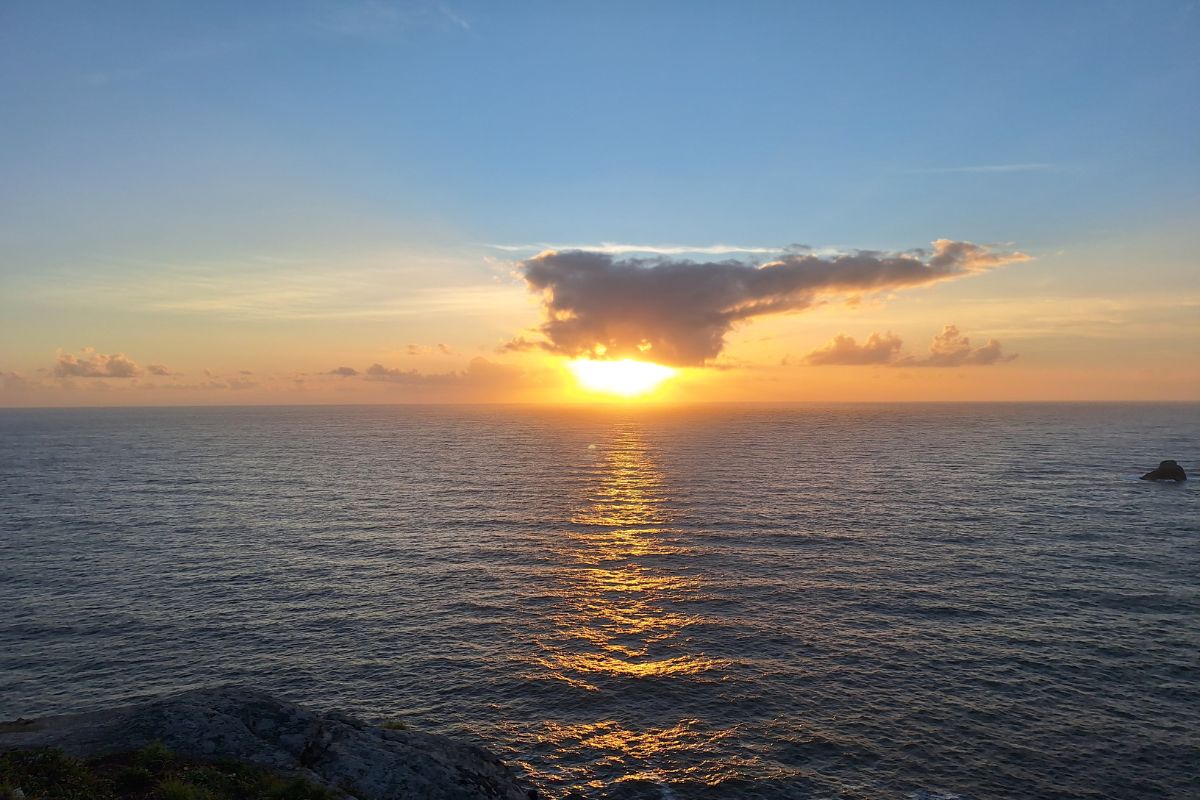February on the Camino de Santiago offers a unique and tranquil experience, perfect for pilgrims seeking a deeper connection with the spiritual and cultural essence of this historic route. Unlike the busier months, this time of year allows you to walk the trails with greater peace, savoring the serenity of winter landscapes and charming villages almost entirely to yourself. In this article, we’ll explore what it’s like to walk the Camino de Santiago in February and which routes are best suited for this season.

Female pilgrims walking the Camino de Santiago in February
The Camino de Santiago in February
February sits in the heart of winter, bringing weather typical of the season. However, along the Camino de Santiago, it reveals stunning and peaceful landscapes. Cold temperatures and occasional rain are common, but they don’t deter the most determined pilgrims. This low season ensures fewer crowds, making it perfect for those seeking solitude and tranquility.
In northern Spain, frost-covered fields, silent forests, and peaceful villages create a magical atmosphere. However, it’s not all charm, and there are some challenges to consider. For this reason, given what it means to walk the Camino de Santiago in winter, it’s crucial to be well-informed and properly prepared with suitable clothing and footwear, as well as to plan details like which route to take and where to stay.

The weather in February will present you with atmospheric landscapes shrouded in mist
Advantages and Disadvantages of Walking the Camino in February
Key advantages of walking the Camino de Santiago in February include:
- Fewer crowds: With fewer pilgrims, you can enjoy solitude and fully immerse yourself in nature.
- Lower costs: Accommodation is generally cheaper than during peak season.
- Unique landscapes: Snow in certain areas and winter scenery provide breathtaking views.
- Galician Carnival: Experience Entroido, a traditional Galician festival that blends joy and local culture.
On the other hand, the following disadvantages should be considered:
- Cold weather: Low temperatures and the possibility of rain or snow can make the journey more challenging.
- Fewer services available: Some hostels and restaurants close during the off-season.
- Shorter days: With fewer daylight hours, careful planning of each stage is essential.
- Risk of difficult terrain: Ice or mud can make certain paths more demanding.

It’s important to be sensible and avoid unnecessary risks, so we recommend choosing routes that steer clear of snow
Recommended Routes for Walking the Camino in February
As you may know, there are many Jacobean routes, but since it’s winter, we recommend those that offer milder weather and better logistical support for planning your journey.
Camino Francés
The most popular route, well-marked and with services available year-round. However, depending on where you start, certain mountainous sections like Roncesvalles, Cruz de Ferro, or O Cebreiro may have snow. The best option is undoubtedly the Camino Francés starting from Sarria.

On the Camino Francés, you will encounter high mountain passes
Portuguese Camino
With milder weather, this route is ideal for February. It passes through historic cities like Porto, Tui, and Pontevedra, blending culture, nature, and easy walking terrain. The best option is the Portuguese Camino starting from Tui.

On the Portuguese Camino, you shouldn’t face major issues with the weather
Portuguese Coastal Camino
As a scenic alternative, this route follows the Atlantic coastline, offering stunning sea views and a mild climate. It’s perfect for those who prefer ocean landscapes and a more laid-back atmosphere. You can start from Vigo, Baiona, or A Guarda.

The Portuguese Coastal Camino hides some truly special trails
English Camino
Shorter and more accessible, the English route is ideal for February due to its straightforward path—perfect for making the most of shorter days—and its charming rural and coastal landscapes.

Pilgrims walking the English Camino in winter
Camino to Finisterre and Muxía
This route is a symbolic extension toward the coast, known as the “end of the world.” It features rugged landscapes and breathtaking sunsets, making it a perfect option for those looking to extend their spiritual journey after reaching Santiago.

With a bit of luck, this reward awaits you on the Camino to Finisterre and Muxía
Sanabrés Camino
This route, a variant of the Vía de la Plata, offers the chance to experience Entroido, the Galician Carnival. For this reason, it might be the best option for February—starting the Sanabrés Camino from Puebla de Sanabria or Ourense to fully enjoy this ancient celebration.

The Galician Carnival, or Entroido, is especially popular in the province of Ourense
Essential Tips for Walking the Camino de Santiago in February
As mentioned earlier, careful planning and preparation are key for tackling the Camino de Santiago in February. Remember, it’s the low season and winter weather prevails, so keep the following tips in mind:
- Choose routes suited for winter: All routes are well-marked, but focus on those with milder weather and available accommodation options.
- Plan your lodging: Book in advance, as many accommodations close during winter.
- Dress in layers and waterproof gear: Wear thermal clothing, a waterproof jacket, and water-resistant footwear to handle cold and rain.
- Start early and carry a flashlight: Days are shorter, so make the most of daylight hours and bring a light in case it gets dark.
- Check the weather and trail conditions: Stay updated on weather forecasts and be prepared for sudden changes.

Before you start, as always, you need to plan ahead
Experience the Galician Carnival Along the Camino
The Entroido or Carnival is a truly special celebration in Galicia. Experiencing the Galician Carnival, especially in the province of Ourense, offers a unique way to immerse yourself in Galician culture and its centuries-old traditions. If you plan your route, for example, along the Sanabrés Camino, you’ll have the chance to discover these festivities. Keep in mind that Carnival sometimes falls in March, but don’t worry—celebrations in Ourense often start much earlier than in other places.

With Galician cuisine, you’ll never feel cold
Comforting Cuisine to Beat the Cold
In addition to the vibrant colors and rich traditions of Entroido, Galicia offers comforting cuisine, perfect for warming up during the winter. These festivities wouldn’t be complete without traditional dishes like lacón con grelos (pork shoulder with turnip greens), cocido gallego (Galician stew), orejas de carnaval (crispy fried pastries), and filloas—soft, crepe-like sweets.
Walking the Camino de Santiago in February is an experience that blends adventure and reflection. With proper preparation and the selection of a winter-friendly route, this journey can be unforgettable. Moreover, taking the opportunity to enjoy the Galician Entroido allows you to experience a festival brimming with tradition and color. Traveling and walking the Camino in February offers the chance to discover how food and festivities intertwine, turning each stop along the way into a warm and unique experience.
 Skip to content
Skip to content












Leave A Comment